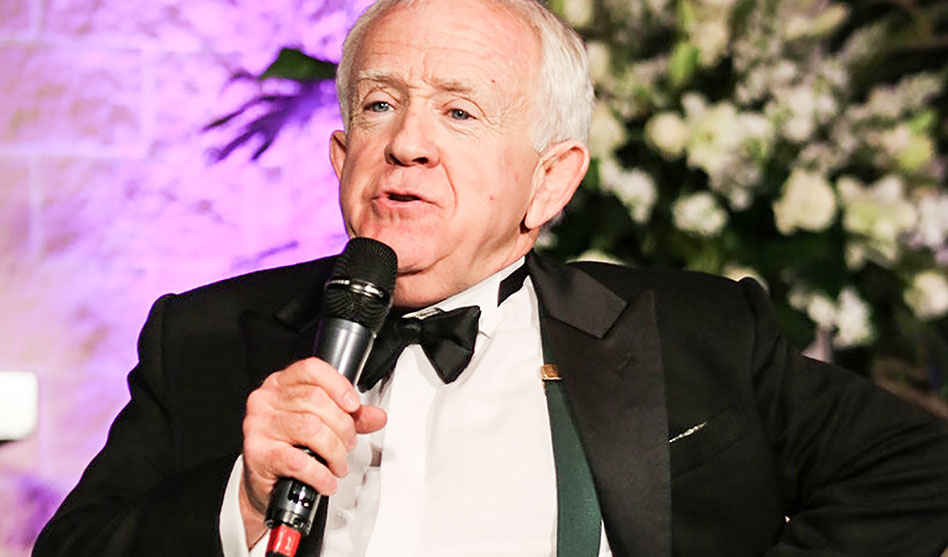North Texans share memories of Leslie Jordan, the TV, movie and social media star who brightened our world with his humor and a life loved authentically
BY THE DALLAS VOICE STAFF
“We all love Leslie.”
It was one comment from one person on one social media post following the death Monday, Oct. 24, of actor and comedian Leslie Allen Jordan. But it summed up most succinctly the country’s response to the loss of a national treasure: Everyone loved Leslie Jordan.
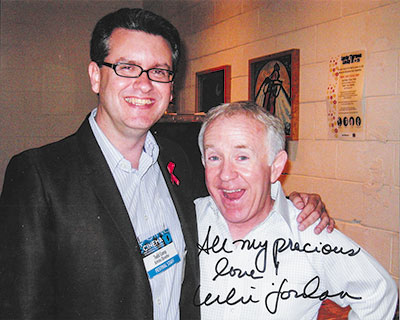
Todd Camp got to know Leslie Jordan through the actor’s many appearances in Fort Worth
Jordan, 67, died Monday after crashing his BMW into a building, most likely as a result of a sudden medical emergency, according to multiple sources. The outpouring of grief was immediate and massive.
The actors and singers and other celebrities he had worked with through the years — starting in 1989 when he got his first big break on Murphy Brown, through his days as Beverly Leslie on Will & Grace (for which he won an Emmy) and his sudden social media super stardom on Instagram, right up through his current recurring role on Call Me Kat with Mayim Bialik and Cheyenne Jackson — took to social media to honor him and to mourn his death.
Among the most touching of the tributes were from those knew him best, of course, especially posts by Del Shores, the Texas playwright who provided Jordan with perhaps his most memorable role, as Brother Boy in Shores’ play Sordid Lives and its sequels on stage and film.
“I’m processing this loss and it is beyond devastating,” Shores wrote shortly after Jordan’s death. “Thank you for all the messages, calls and condolences. This is all I can do right now. I’ll be back.”
In a later post, Shores continued, saying Jordan had been his friend for 37 years and was like a brother to him. “I will miss you my friend. Daily. Deeply,” Shores wrote. “I will laugh less, and the list of what I will miss about you is vast. I have often described my friend like this: ‘Leslie Jordan has more talent per inch than anybody I have ever known.’ My life, my career has been so much better because of you, Leslie Allen Jordan. R.I.P. Brother Boy.”
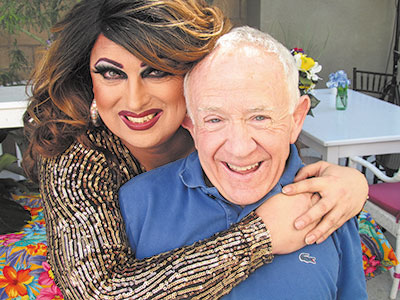
James “Cassie Nova” Love met Leslie Jordan while filming A Very Sordid Wedding
Although he was actually from Chattanooga, Tenn., we here in North Texas claimed Jordan as one of our own, and many had their own memories and stories of when they met him.
Jordan’s connections to Fort Worth go back several years, according to Todd Camp, who wrote on Facebook that the connection started “with his unforgettable performance as Brother Boy in the Del Shores’ play Sordid Lives at Circle Theatre in June of 1997.” Jordan returned to Circle Theatre over the next two years with his own play, Hysterical Blindness and Other Southern Tragedies That Have Plagued My Life Thus Far, and in 2000 he was back for Q Cinema and the Texas premier of his autobiographical feature film Lost in the Pershing Point Hotel.
Camp recalled seeing Jordan one day at lunch when he was in Fort Worth during the run of Hysterical Blindness. When Camp asked Jordan about being so openly gay as an actor, Jordan responded, “Oh honey, I fell right outta my mother’s womb and into her high heels.”
Jordan came to Dallas in 2001, the same year he joined Will & Grace, to appear in Shore’s Southern Baptist Sissies at the McKinney Avenue Contemporary, and in 2003, Q Cinema brought him back to Fort Worth for a one-man show at Casa Mañana called When You Swish Upon a Star. He returned to Cowtown in 2008 for QCinema’s 10th anniversary with a one-man show at the Scott Theatre called My Trip Down the Pink Carpet, based on his then-newly-released book by the same name.
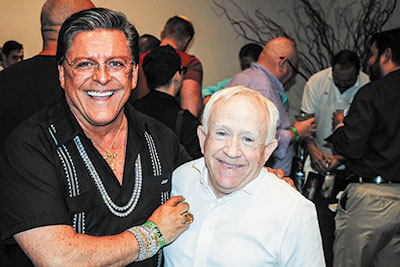
Joe Pacetti met Leslie Jordan at a fundraiser and convinced him to come to Dallas to benefit Legacy Cares
“Looking back on all of the posts since Leslie’s unexpected death, I’m reminded of how much of himself Leslie shared with every single person he met,” Camp said. “We had lots of dealings in a professional capacity, with me as a host or promoter and him as talent or a guest. But on those rare occasions when we could actually sit and have a conversation with one another, he always made me feel like a confidant and a friend. It’s a relationship I’’ve learned that he shared with dozens of my friends and acquaintances, and it’s that instant familiarity he nurtured that has made his passing so painful for so many of us.
“His personal struggles — with drugs, alcohol, dating the wrong men — are instantly recognizable weaknesses familiar to many gay men, and I have several friends who credit him with helping them through addictions to any or all of those temptations. I always knew he was too bright a star for us to hang onto in DFW, and, during the pandemic, he gave millions of people some insight into that unique gift of gossipy gab that endeared him to so many of us in North Texas,” Camp continued. “From that point on, he was no longer our private obsession but the world’s. It’s going to take a long time for me to accept that he’s really gone and an even longer time to be at peace with it. He won’t soon be forgotten.”
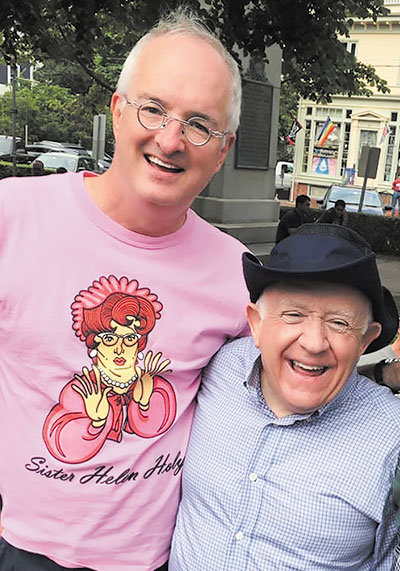
Paul Williams worked on cruise ships with Leslie Jordan
Jordan’s ties to Dallas run deep, too, anchored at least in part by his long-running association with Legacy Cares.
Melissa Grove, Legacy’s former executive director, said Jordan raised hundreds of thousands of dollars for that agency with his annual performances in Dallas. And even after his celebrity increased he remained the same down-to-earth person he had always been.
“He was not a diva,” she said. “He just rolled with whatever happened. Whether we had rented the Majestic [Theater] or had him perform at Cathedral of Hope.”
She said his meet-and-greets including individual photos with him packed them in. One year, they had sold so many that the next year, he asked to not repeat it.
“He was a very kind person,” Grove said. “I truly appreciated him and his generosity.”
To publicize his local live performances, Jordan appeared on Lambda Weekly, the LGBTQ talk show that’s been heard on 89.3 KNON-FM for almost 40 years is hosted by Dallas Voice’s David Taffet and activists Lerone Landis and Patti Fink.
“Jordan was always the easiest guest to prepare for because we never even got through the introduction and Leslie was off and running. The next word we could get in was ‘We need to take a break,’” Taffet said.
“I’m heartbroken about Leslie,” Fink said. “What a tremendous loss.”
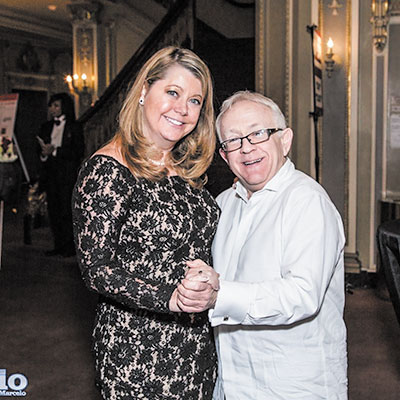
Leslie Jordan said he came to Dallas to perform benefits for Legacy Cares because he loved Melissa Grove, and Grove loved him too
“He was just as funny, witty, kind and lovable in real life as he was in front of the camera,” Landis said.
“Whenever we knew that Leslie would be our guest, we knew our spirits would be lifted no matter our mood.”
Although he was extremely generous with his time, at some point, his manager made him cut down on his free appearances, Jordan explained as he was preparing to come to Dallas for another Legacy fundraiser. So he decided to concentrate his work on three cities. The hosts thanked him for making Dallas one of those cities.
“No,” he laughed in response. “Dallas isn’t one of those cities.” But, he said, he loved Grove and wanted to help her.
Jeweler Joe Pacetti was the Legacy link to Jordan. They had met at a charity luncheon in Los Angeles.
A friend of Pacetti’s on the board of Hope House in L.A. was hosting a charity luncheon and asked Pacetti for a piece of jewelry to auction. When Pacetti donated a diamond, he got a call from his friend encouraging him to attend the event. That’s where he met Jordan. They hit it off, and Pacetti told Jordan about Legacy Cares.
“I’d love to help you,” Jordan told him. “If there’s anything I can ever do.”
As a matter of fact, Pacetti told him, there was. He arranged Jordan’s first appearance at a fundraiser for Legacy, held in the penthouse of the Vendome on Turtle Creek, that raised about $6,000.
It was just the first of Jordan’s many performances to benefit Legacy. The largest was a sold out performance at the Majestic Theater in 2015 celebrating Pacetti’s 60th birthday.
Paul J. Williams recalled opening for Jordan a number of times in Dallas, including at the Majestic performance.
“It was such a treat to be able to have an audience that was already pumped up, excited to see Leslie,” Williams said. “It was an honor.”
Williams said he first met Jordan when the two were working on gay cruises together. He said after a performance, he asked Jordan if he had fun on stage. Jordan answered, “Oh girl I was alive up there.”
Williams had a long list of stories about performing with Jordan and just spending time with him. He told one story about working a Mediterranean RSVP cruise. The entertainers were staying in a hotel in Barcelona before boarding the ship, and the hotel was serving a tapas buffet. Nothing on the table looked appealing to Jordan.
“I don’t really like any of this,” Jordan told Williams. “I’m going across the street to get something.”
But just as he was about to leave, a team of high school rugby players also staying in the hotel came into the restaurant. Jordan looked at them and turned to Williams and said, “Oh, I’m sure I can find something to eat here.”
“He could tell the filthiest jokes,” Williams said, and then innocently get away with it.
But Williams remembers Jordan most for his kind heart. “He knew about my sobriety struggle,” Williams said.
Before he was about to perform at the show at the Majestic, Jordan told him, “I’m so glad you didn’t die.”
James Love, who appeared as his drag alter ego Cassie Nova in the movie A Very Sordid Wedding, in which Jordan appeared once again as Brother Boy, said this week that Jordan “just had a light about him and we were but moths drawn to his humor.”
Love continued, “I remember the day we were filming the Rose Room scene in A Very Sordid Wedding. He walked into our dressing room while we were still getting ready. We all stopped what we were doing, even though we were all running behind, to listen to him. He goes right into a story about why he was late. “He said ‘Sorry I’m late y’all, but I was in the woods last night watching Lady Gaga get plowed by Cuba Gooding Jr. while some white trash rednecks jacked off!’ Then moved on to the next subject with no explanation. I thought, that’s how you make and entrance. Krystal Summers and I both knew exactly what he was talking about; he had just finished filming American Horror Story: Roanoke. We were absorbing everything he said. It was so cool. He kept everyone entertained all day just by being his true and authentic self.”
Love concluded, “He was a natural born entertainer. I am sad today because we lost him, but I will always smile when I think of him. That is an incredible legacy.”
But why was it that EVERYONE loved Leslie, even those who never had the chance to meet him? Because, said Dallas counselor Candy Marcum, he was “authentic, not an act,” and people are drawn to that.
In 2020 when the COVID pandemic hit and the world went into lockdown, Jordan took to social media to entertain himself and the rest of us with his daily posts, videos that often started with him asking his “fellow hunker-downers, “Well, shit. What are y’all doin?”
His Instagram account quickly grew from about 8,000 followers to more than four million. Marcum said that was because the stories Jordan told rang honest and true.
“During the pandemic, people needed laughter,” she said. And despite how bawdy he could get, there was nothing malicious about him. His stories were often about his family; he’d be eating his mother’s cornbread and telling funny stories about it, but you knew it was the best corn bread ever baked.
Marcum said the first thing she ever saw Jordan in was Sordid Lives. What attracted her to it at first was Brother Boy was in a state hospital in her home town, Big Spring, where there actually is a state hospital.
“It was different that it would show a gay person in a positive light even though he was in a state hospital and in drag,” she said. “Everyone loved Brother Boy.”
She said with Jordan’s death we’re losing not just a great comedian, but a great activist because comedy can be activism. “One of our superpowers is our sense of humor,” Marcum said. “I think we use it all the time. It’s disarming. Makes people perk up.”
Humor, she said, is universal. When we’re laughing at the same things, it attracts allies. And with each new role, as Jordan attracted fans, he created allies.
“He changed hearts and minds,” Marcum said. “He gave us inspiration and motivation to keep going. And we need to keep going the way our country’s going right now.”
Emerson Collins, another alumni of Shores’ Sordid world, summed it up with his social media tribute to his friend: “He had no choice but to be out and proud from the beginning. He didn’t hide, because he couldn’t; he was an out gay actor when few could [be] or did.
“Will & Grace and Sordid Lives made him a titan of an example to me, as an out man and as an actor,” Collins continued. “He set the bar so high it remains a reminder and an inspiration of an authentic life — warts and all.”




